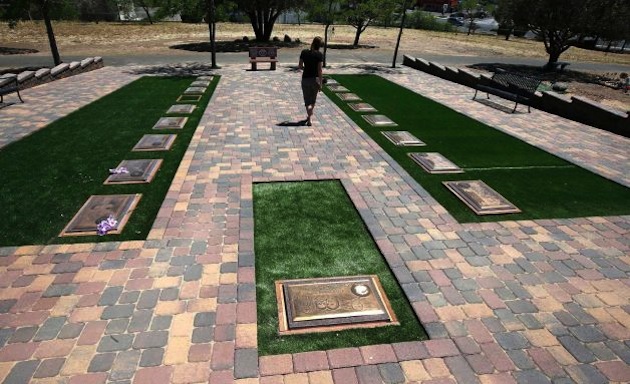

Katie Cornelius, a Prescott Fire Department volunteer exhibit curator of the Tribute Fence Preservation Project, read the names on the grave markers at the memorial site in Pioneer Cemetery where 19 Granite Mountain Hotshots are honored nearly a year after all of them died fighting a wildfire on Tuesday, June 24, 2014, in Prescott, Ariz. (AP Photo/Ross D. Franklin)
This weekend last year, nineteen of our finest men, fell in battle with the demon known as a forest fire in the hills of the city of Phoenix near a small mining community called Yarnell.
Conditions were marginal at best for fighting this fire. Monsoon-like winds made predicting the direction and intensity of the fire problematic, yet these brave souls went without complaint to try and limit this fire’s destruction on the homes and property of the residents of the town.
This is what they were trained to do.
The Granite Mountain Hotshots, a specially trained and experienced firefighting unit, was virtually wiped out by that fire and there are many among us who are now questioning the wisdom of the decision. There are some who say that it’s not worth it; that global warming caused the death of this team; that exposing our men to danger is too risky; and that we may be pandering to thrill-seeking individuals in order to protect our homes.
To do so, is to dishonor their memory and their chosen profession.
Firefighting, as a profession, has been around since early Roman times. It was done for profit and for safety. For a large part, professional firefighting societies were as much a social gathering as it was anything else. To be a part of a firefighting unit was to be considered an elite member of society; even the helmets and badges they traditionally wear hearkens back to the ancient days of wearing top hats and special insignia to denote their elite status.
Today, the social club status of firefighting still pervades modern American society — more than 70% of firefighting units in existence in the United States are strictly voluntary units and the majority of fires nationwide are extinguished on a volunteer basis.
Firefighting still carries with it a mark of heroism. It is more than just heroism of the first responder that is denoted; it is the historic badge of society’s defenders that they proudly wear. A badge they chose to wear not for the reason of ego, but sacrifice.
The role of the hero is not one of aggrandizement, but one of service and self-sacrifice.
When we take heroism out of society, we lessen the strength of society. It is the lesson of about the truth of human existence. You cannot have good without evil. You cannot have greatness without consequence. You cannot have honor without loss. You cannot have life without death.
Thus when families, loved ones, friends and society as a whole lose their heroes as we did with those nineteen brave souls this weekend, we are not lesser for it, but greater. Their families should be comforted knowing that they died defending not the property and homes of the residents of Yarnell, but rather the ideology of what makes America great — the role of the individual and the value of a single man against the forces of nature.
To suggest that nature is more important than man, or somehow should take precedence over man’s right to control the environment around him, also lessens the integrity of what they stood for.
We would all like to have them back, especially on this most American of holiday weekends, the Fourth of July. We all wish they were alive with us today. Nevertheless, we cannot take away from them — and, men and women like them — the one thing they valued and dishonor their chosen profession by undermining the reason they were there.
There is a monument at Thermopylae, which has a few words inscribed upon it:
“Go, stranger, and to Lacedaemon tell
That here, obeying her behests, we fell.”
Let us collectively and figuratively bang our swords against our shields and honor not only what they did, but what they stood for. Be glad in their passing from this world to the next and rejoice in their heroism. Weep not for the fallen, for they went fighting for what they believed in. Do not take away from them the power of what they did.
It is oft-said that what is important is not to remember how they died, but how they lived.
And oh, how they lived.
Thomas Purcell is host of the Liberty Never Sleeps podcast show and more of his work can be read at libertyneversleeps.com.
The most damning journalistic sin committed by the media during the era of Russia collusion…
The first ecological study finds mask mandates were not effective at slowing the spread of…
On "What Are the Odds?" Monday, Robert Barnes and Rich Baris note how big tech…
On "What Are the Odds?" Monday, Robert Barnes and Rich Baris discuss why America First…
Personal income fell $1,516.6 billion (7.1%) in February, roughly the consensus forecast, while consumer spending…
Research finds those previously infected by or vaccinated against SARS-CoV-2 are not at risk of…
This website uses cookies.